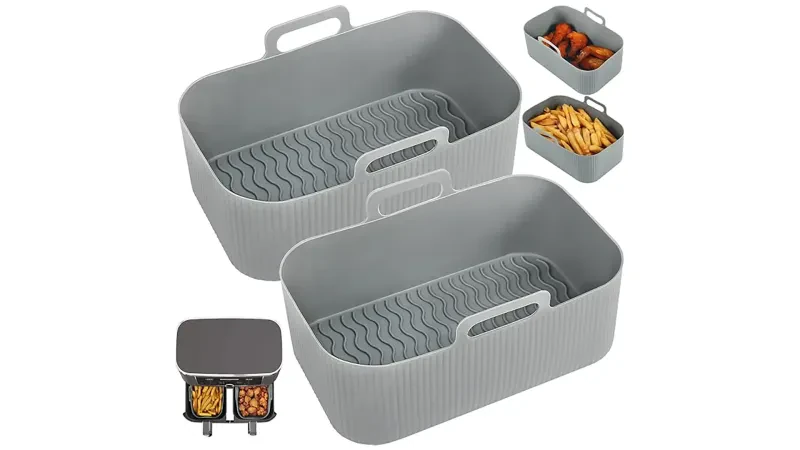Health benefits of air frying: Exploring the advantages for your well-being
As people become more health-conscious, enjoying tasty food without compromising nutritional value has become a top priority. Air frying is an innovative cooking method that has recently gained significant popularity. By using hot air circulation and a minimal amount of oil, air fryers offer a healthier alternative to traditional frying methods. Let's explore some of the standout health benefits that air frying brings to the table.
Reduced fat intake
One of the primary reasons why air frying is considered a healthier option is its ability to reduce fat consumption significantly. Traditional deep frying requires submerging food in oil, resulting in high-fat absorption and a calorie-rich meal. On the other hand, air fryers use rapid air circulation combined with a small amount of oil to achieve crispy and delicious food. This method can reduce fat content by up to 75%, making air frying a great choice for individuals trying to manage their weight or maintain a healthy diet.
Less harmful compounds
When food is deep-fried, especially at high temperatures, it can lead to the formation of harmful compounds like acrylamide. These compounds have been associated with an increased risk of certain types of cancer and other health issues. Air frying, due to its lower oil requirement and cooking temperatures, reduces the production of harmful compounds, making it a safer option for your overall well-being.
Retained nutrient value
Unlike traditional frying methods that can drain food of its nutrients, air frying helps retain the nutritional value of your meals. Since air frying relies on hot air circulation instead of oil to cook food, vitamins and minerals present in the ingredients, remain largely intact. This means you can enjoy healthier meals without sacrificing the essential nutrients your body needs.
Lessens carcinogen intake
When foods are fried using traditional methods, there is a risk of consuming higher amounts of heterocyclic amines (HCAs) and polycyclic aromatic hydrocarbons (PAHs). These carcinogens are formed when meat is cooked at high temperatures, increasing the potential health risks associated with fried foods. Air frying significantly reduces the production of HCAs and PAHs, making it a safer choice for those concerned about the potentially harmful impact of these substances on their health.
Minimal use of oil
Air fryers require only minimal oil to achieve that desirable crispy texture. This is a significant advantage over traditional frying methods that often require a large volume of oil for successful cooking. Using just a small amount of fat can enjoy the same textures and flavours you love while considerably reducing your overall calorie intake.
In conclusion, air frying offers numerous health benefits, making it an appealing alternative to traditional frying methods. With reduced fat intake, lower production of harmful compounds, retained nutrient value, and minimized intake of carcinogens, air frying is an excellent option for individuals striving to maintain a healthy lifestyle without compromising on taste.
Cooking convenience with an air fryer: Time-saving and ease of use compared to traditional frying
Regarding cooking methods, the air fryer has quickly gained popularity as a convenient alternative to traditional frying. Not only does it offer a healthier way to enjoy your favourite fried foods, but it also saves you time and effort in the kitchen.
1. Time-saving:
One of the key advantages of using an air fryer is its ability to reduce cooking time significantly. Unlike traditional frying methods that require preheating, the air fryer is ready to use in seconds. Its rapid air circulation technology evenly distributes heat, resulting in faster cooking times. For example, if it takes 20 minutes to cook a batch of french fries in a conventional oven, an air fryer can achieve the same results in as little as 10 minutes.
2. Ease of Use:
Another compelling reason to choose an air fryer is its ease of use. With simple controls and intuitive settings, even novice cooks can confidently operate an air fryer. Most models come with pre-programmed cooking settings for popular dishes, making it a breeze to prepare various meals. Additionally, air fryers are designed with user-friendly features like a digital display, temperature control, and timer, allowing you to set precise cooking parameters without guesswork. Cleaning an air fryer is also hassle-free as most components are dishwasher safe.
Moreover, compared to traditional frying, working with an air fryer eliminates the need to handle hot oil. This makes it safer, as there is no risk of accidental spills or burns. Air fryers reduce the risk of harmful splatters and associated cleanup by using only a minimal amount of fat.
Overall, the convenience offered by an air fryer is hard to beat. It saves you valuable time and takes the guesswork out of cooking, allowing you to enjoy delicious and crispy fried dishes without compromising on taste or health considerations.
Economics and environmental impact: Discovering the cost-effectiveness and sustainability of air frying
Air frying has gained considerable popularity recently, touted as a healthier alternative to traditional frying methods. However, its benefits are not limited to health alone. In this section, we will explore the economics and environmental impact of air frying compared to its conventional counterpart.
Cost-effectiveness
One of the significant advantages of air frying is its cost-effectiveness. Traditional deep-frying methods require substantial oil to submerge the food, leading to potentially expensive expenditures on cooking oil. On the other hand, air fryers typically use minimal oil or even require no oil at all. This reduction in oil usage helps lower your grocery bills and contributes to long-term savings.
Furthermore, air frying can also save you money by consuming less electricity. Compared to conventional ovens or deep fryers, air fryers have shorter cooking times, decreasing energy usage. By utilizing rapid air circulation technology, air fryers deliver quick and efficient cooking, minimizing the time and energy required to prepare meals.
Sustainability
In addition to its cost-effectiveness, air frying also has positive environmental implications. Traditional frying methods produce a significant amount of waste in the form of used cooking oil, which can be difficult and expensive to dispose of responsibly. Improper disposal of oil can lead to environmental pollution, including contamination of water sources and harm to aquatic life.
Air frying eliminates this problem by reducing or eliminating the need for cooking oil. With air fryers, you can enjoy crispy, fried-like results with significantly less or no oil, resulting in minimal waste and easier cleanup.
Furthermore, air frying emits fewer harmful emissions compared to conventional frying methods. Deep-frying can generate smoke, fumes, and odours, which may be unpleasant and contain potentially harmful substances. Air frying frees your kitchen from excessive smoke, reducing indoor air pollution and creating a healthier cooking environment.
Overall, air frying offers health benefits, economic advantages, and environmental sustainability. By reducing oil consumption, energy usage, and waste generation, air frying presents a cost-effective and environmentally friendly alternative to traditional frying methods.


